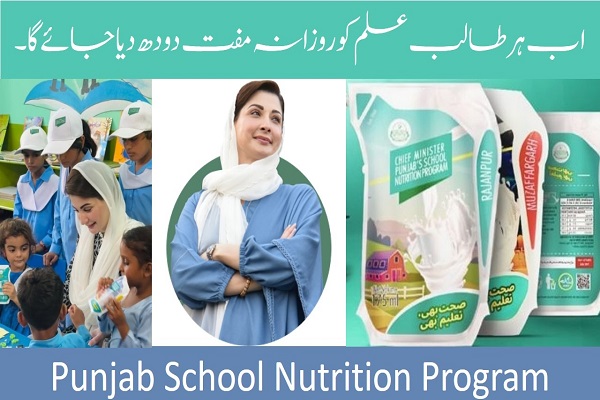Maryam Nawaz Launches the Largest School Nutrition Program in Punjab
Largest School Nutrition Program in Punjab
It is critical to provide children with the necessary foundation for a healthy life, and nutrition is an important part of that journey. Recognizing this need, Maryam Nawaz launched Punjab’s largest School Nutrition Programme under the CM Punjab Scheme, which seeks to offer balanced and nutritious meals to schoolchildren across the state. This effort addresses a vital need: improving student health and well-being while also promoting academic performance.
This article will go over the program’s goals, benefits, eligibility, and implementation specifics, bringing light on how it intends to build healthier and more productive learning environments in Punjab.
1. Introduction to the School Nutrition Program
Maryam Nawaz has launched a landmark school nutrition initiative as part of the New Government Punjab Scheme to tackle child malnutrition in Punjab. This large-scale program aims to assist thousands of pupils in government schools by delivering healthy meals and raising awareness about the importance of nutrition. According to current research, poor nutrition has an influence on both physical and mental development, making it critical for young students to eat balanced meals.

2. Objectives of the Program
The School Nutrition Program was developed with a few major goals in mind:
- Combat Malnutrition: Improve Punjab students’ nutritional intake to minimize malnutrition, anemia, and vitamin deficiencies.
- Increase Educational Performance: Provide balanced meals to boost focus, energy, and cognitive growth, resulting in higher educational achievements.
- Raise Awareness of Healthy Eating: Educate children and their families on the value of nutrition and how to incorporate balanced diets into their daily lives.
Highlighted quote:
3. Nutritional Impact on Learning and Health
Numerous studies have linked healthy diet to improved academic achievement, cognitive function, and mental health. Children who obtain well-balanced diet tend to have better concentration, memory, and participation in school activities. This program strives to deliver these benefits to students by creating an environment that promotes both study and personal development.
4. Program Structure and Meal Plans
The School Nutrition Program is intended to deliver nutritious meals adapted to children’s nutritional needs at various age levels. Meals often include:
- Proteins that promote growth include eggs, dairy, and legumes.
- Whole grains, such as brown rice and wheat, provide lasting energy.
- Fruits and vegetables: Fresh food high in critical vitamins and minerals.
- Dairy: Milk or yogurt include calcium and vitamin D.
The curriculum also includes daily calorie intake suggestions to ensure that pupils have enough energy to focus during the school day.
5. Who is Eligible for the Program?
The School Nutrition Program primarily targets Punjab government school children, particularly those from rural and poor areas.

6. How to Register for the Program
Parents and guardians may enroll their children in the program through the school administration.
- Contact the School Authorities: Parents should visit the school and talk to the administration about the feeding program.
- Submit Required Documents: Proof of enrollment, family income proof (if necessary), and a medical record may be sought.
- Attend Parent Meetings: Schools will organize periodic meetings to educate parents on the program’s benefits and keep them up to date on food planning.
Once registered, pupils will automatically get meals according to the timetable established by the school under the CM Punjab Scheme.
7. Funding and Partnership in the Program
The Punjab government funds this program, with potential support from local non-governmental organizations (NGOs) and international child nutrition groups. The goal is to sustain this project for the long term and, if successful, spread it to other regions. Partnerships with local food suppliers and dietitians guarantee that the program meets high quality requirements.
8. Benefits of the School Nutrition Program
This school nutrition effort provides a variety of benefits, both immediate and long-term:
- Improved Health and Immunity: Eating well-balanced meals on a regular basis will help to strengthen the immune system, minimizing absenteeism.
- Improved Academic Performance: Proper nutrition boosts concentration, energy, and involvement, which can benefit students’ academic performance.
- Support for Low-Income Families: By providing free meals, the program reduces the financial burden on families while also ensuring children have access to nutritional food.

9. The Future Vision for the Program
As the initiative continues, the New Government Punjab Scheme plans to spread to more parts of the province. Future phases could include:
- Introducing Breakfast Programs: Breakfast will be provided in morning classrooms to improve cognitive function.
- Nutrition Workshops: Providing workshops for students and parents on how to maintain a balanced diet at home.
-
10. Frequently Asked Questions (FAQs)
1: Is the School Nutrition Programme available in all districts of Punjab?
Currently, the initiative is being implemented in certain districts, with hopes to expand to additional regions in the future.
2: Will the meals cater to children with special dietary requirements?
Yes, meal plans are intended to accommodate dietary restrictions and allergies whenever possible. Schools will collaborate with nutritionists to provide safe options for all pupils.
3: How frequently will meal plans be updated?
Meal plans are periodically reviewed and changed to reflect seasonal crop availability and nutritional recommendations.
4: Will the program offer nutritional education to students?
Yes, the program includes workshops and activities that teach students about healthy eating habits.

11. Conclusion
Maryam Nawaz’s School Nutrition Program is a critical component of the CM Punjab Scheme, demonstrating a commitment to combating child malnutrition. By feeding students with healthy meals, the initiative creates healthier learning environments, improves academic achievement, and lays the groundwork for healthier future generations. As the effort grows, it has the potential to not only improve children’s health but also develop a culture of nutrition and wellbeing throughout Punjab. This daring initiative to improve child health and education represents a forward-thinking attitude to creating a brighter, better Punjab for all.
Maryam Nawaz’s leadership in the New Government Punjab Scheme exemplifies how targeted nutritional support may have a direct influence on the well-being and potential of young brains.







